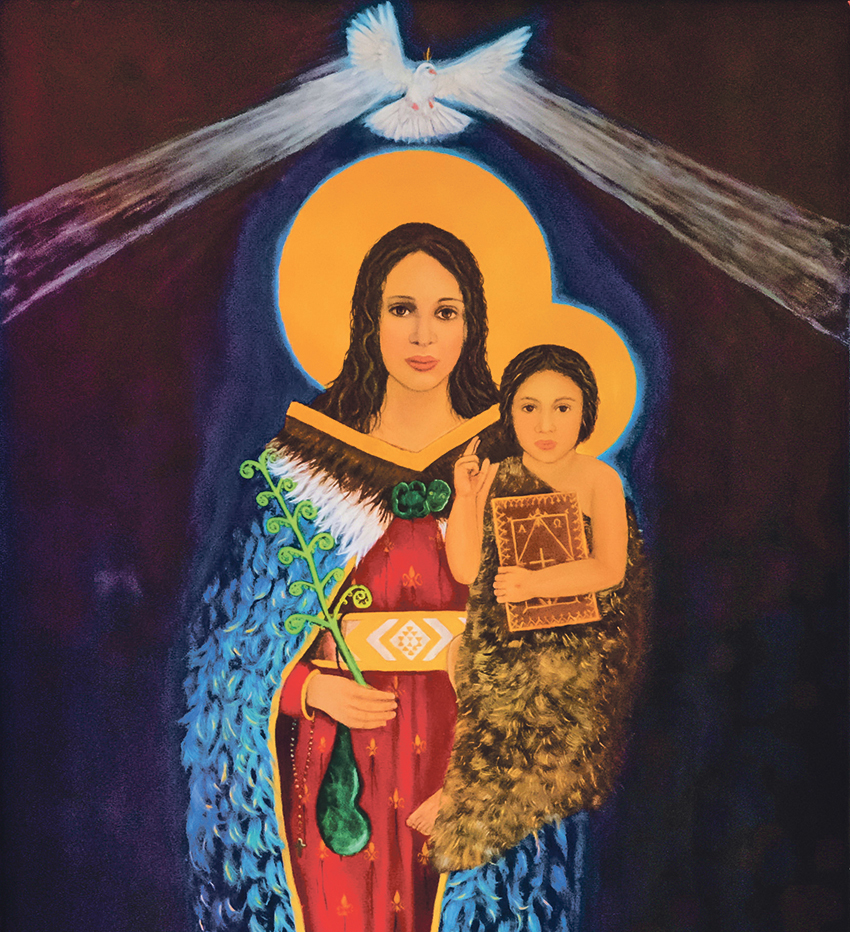Published in WelCom August 2022
Powerful protector, gentle guide
The Church marks Sunday as the ‘foremost holy day of obligation’ (Catechism of the Catholic Church, n2177). In New Zealand we have two additional ‘holy days’, the Assumption of Mary and Christmas Day. Following her death, Mary the mother of Jesus was ‘assumed, body and soul, into heaven’ – she knows the fullness of life in the reign of God. The Church in Aotearoa New Zealand has adopted Assumption Day, August 15, as its patronal feast.
Fr James Lyons

There’s an old Charlie Brown cartoon that describes security as hearing your mother in the kitchen when you come home from school.
It may not be such a common sound these days with most adults usually working outside the home. But I remember it from my own childhood, and I’ve often thought of Jesus hearing it too. Knowing his mother was nearby, would have given the boy Jesus the same feeling of being safe and cared for that is recognised – and longed for – even today.
This unspoken longing for protection, security and being wanted for ourselves, unashamedly associated with mothers, supports our Christian tradition of a loving devotion to Mary, Mother of Jesus.
The festivals in the Church’s calendar that bear her name provide us with aspects of mothering, which equip her with a heart that readily embraces very human situations. She experienced:
- the reality of giving birth;
- the trauma of being a refugee;
- the panic of losing a child in a crowded city and the joy of reuniting;
- the sense of helplessness when her son is misunderstood and maligned;
- righteous anger when her own family regards her son as delusional;
- the unspeakable grief as she watches her son tortured and killed.
There is also her unshakable faith leading her to know the wonder of resurrection; and the courage and love enabling her to stand with the ones who had abandoned Jesus, drawing them together to experience their own resurrection through forgiveness.
For all this, Mary of Nazareth, Wife of Joseph, Mother of Jesus, is honoured by Christians as Mother of the People of God, Mother of Mercy, Help of Christians, Queen of Peace.
But – a reading chosen for the Mass on Assumption Day (15 August), from the last book of the Bible, the Apocalypse, pictures this same Mary as an object of hate; to be hunted down destroyed by Satan, the great enemy of God, because she carries the antidote to evil and disorder.
The Apocalypse (also called the Book of Revelations) presents God’s enemy as a dragon, manipulated by envy. The woman who is to give birth to the one who can overcome evil must herself be a person of the greatest love, for only love can turn the tide on those whose agenda is domination, destruction and death.
There’s a reminder here of Simeon’s prophecy when Mary and Joseph formally presented the child Jesus in the Temple. Simeon spoke glowingly of the destiny of Jesus but then warned Mary, a sword will pierce your own soul too [Luke 2:35].
When you or I are hurt by another’s action or slander the immediate reaction is to hit back. But the model given us in Mary is to trust in the ‘power of God’s arm’ to bring good out of evil. Mary’s ‘sword’, far from fatally wounding her, opened up a pathway to mercy and compassion and this is her gift to us.
Mary proclaims the greatness of the Lord – whose mercy is from age to age. She pondered deeply the good things God had already done for her, seeing them rise from the heartache and suffering she encountered in her life.
The Assumption of Mary is the climax of mercy, her entry into the fullness of life with God. The perfect fulfilment of her life invites each of us to ponder deeply the power of mercy to change hearts, to soften thoughts of vengeance and to develop a way of life that cultivates dialogue, reduces tension, and transforms the narrowness of self-interest into a willingness to listen to other points of view and to look for the good in what might first appear to be totally bad.
Pope Francis, in his widely acclaimed writing on ‘The Joy of Love’ [Amoris Laetitia, 2016] emphasises that in every family three words need to be used over and over again: Please, Thank you and Sorry. He calls them three essential words, and writes: Let us not be stingy about using (them), but keep repeating them day after day… The right words, spoken at the right time, daily protect and nurture love. [par. 133]
This can be our action, honouring the truth of Mary’s Assumption – that she, a human person like us, lives fully and completely in God’s presence. The ‘Please’, ‘Thank you’ and ‘Sorry’ you offer in your relationships can be your tribute to the one whose motherly care proudly protects and gently guides all her children.
The post Mary as Mother first appeared on Archdiocese of Wellington.
Celebrating Migrants as Missionaries of Hope
Pastoral
Published on 16th Jun, 2025
June 22 is the Day of Prayer for Refugees and Migrants [..]
Monsignor Brian Walsh’s 50 Years of Priesthood
Pastoral
Published on 23rd May, 2025
Mons Brian celebrated his 50th anniversary on Sunday 18 May [..]
Palmerston North to host parish renewal event
Pastoral
Published on 22nd May, 2025
The Hope and Renewal Summit will be hosted by Palmerston North this October [..]
Meeting with Pope Leo XIV: A new hope for Eastern Churches
Pastoral
Published on 20th May, 2025
Pope Leo XIV received representatives from the Eastern Catholic Churches in an audience [..]
PEACE WITH CREATION
Pastoral
Published on 12th May, 2025
Celebrating the 10th Anniversary of Laudato Si’: Planting Seeds of Hope and Peace [..]
